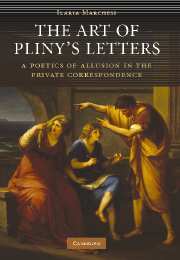Book contents
- Frontmatter
- Contents
- Acknowledgements
- Preface
- Introduction
- Chapter 1 The semiotics of structure
- Chapter 2 Sed quid ego tam gloriose? Pliny's poetics of choice
- Chapter 3 The importance of being Secundus: Tacitus' voice in Pliny's letters
- Chapter 4 Storming historiography: Pliny's voice in Tacitus' text
- Chapter 5 Overcoming Ciceronian anxiety: Pliny's niche/nike in literary history
- From dawn till dusk: four notes in lieu of a conclusion
- Appendix to chapter 5
- List of works cited
- General index
- Index locorum
Chapter 3 - The importance of being Secundus: Tacitus' voice in Pliny's letters
Published online by Cambridge University Press: 22 September 2009
- Frontmatter
- Contents
- Acknowledgements
- Preface
- Introduction
- Chapter 1 The semiotics of structure
- Chapter 2 Sed quid ego tam gloriose? Pliny's poetics of choice
- Chapter 3 The importance of being Secundus: Tacitus' voice in Pliny's letters
- Chapter 4 Storming historiography: Pliny's voice in Tacitus' text
- Chapter 5 Overcoming Ciceronian anxiety: Pliny's niche/nike in literary history
- From dawn till dusk: four notes in lieu of a conclusion
- Appendix to chapter 5
- List of works cited
- General index
- Index locorum
Summary
Quod spatium temporis si ad infirmitatem corporum nostrorum referas, fortasse longum videatur, si ad naturam saeculorum ac respectum immensi huius aevi, perquam breve et in proximo est.
Tac. Dial. 16.6If Pliny's involvement in the composition and publication of light, neo-neoteric, Catullan poetry may have come as a surprise to modern readers, as it certainly did to some of his contemporaries, all the more so should the apparent absence of his voice from the vibrant debates on oratory that were taking place in his day. While it is due to the sometimes capricious (and sometimes judicious) accidents of philology that but a handful of fragments witnessing Pliny's poetry has come down to us, the reason why we have no contribution by him on oratory is simply because he never published anything specifically on the subject. The unexpected absence from Pliny's résumé of any discussion, either as systematic as Quintilian's Institutio or as idiosyncratic as Tacitus’ Dialogus de oratoribus, does not mean, however, that he did not partake in the debates. It only means that he did so through the heterogeneous and indirect medium of his letters, a corpus at which we have perhaps not looked closely enough. Pliny's correspondence contains, in fact, a small but crucial sample of letters that are allusively devoted to a discussion of oratory: they are predominantly addressed to Tacitus and engage in a stringent dialogue with his texts, in particular his Dialogus.
- Type
- Chapter
- Information
- The Art of Pliny's LettersA Poetics of Allusion in the Private Correspondence, pp. 97 - 143Publisher: Cambridge University PressPrint publication year: 2008

